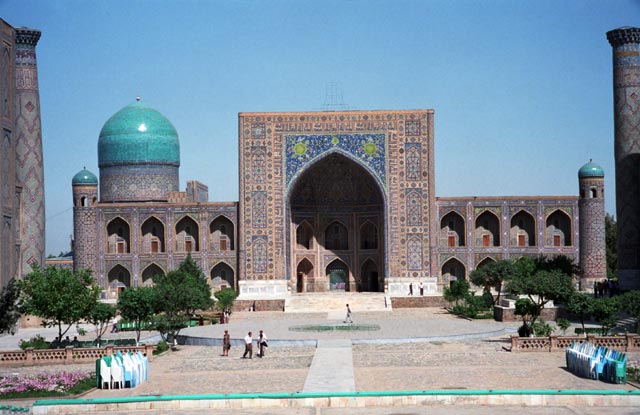
We had an earlier breakfast, at 7 o'clock, and it was fairly cool sat out in the courtyard.
The minibus arrived at 8 o'clock to take us to Samarkand, about a 4-hour journey. We would have travelled by train, but were advised not to, because of security concerns and the difficulty of guaranteeing accommodation on internal Uzbek trains (the British Foreign Office advises against rail travel in Uzbekistan). The minibus was a bit cramped, and as it got towards noon it started to get quite hot (it was not air-conditioned). Farkhad and Maya were both travelling with us, as Farkhad wanted to get to Tashkent and Maya was visiting somebody in Samarkand. For part of the journey, the road was close to the railway line, and as we overtook a freight train we had the idea of stopping further ahead so that we could take photos. Farkhad must have thought we were completely mad, but he communicated our wishes to the driver and we managed to get our photos of the freight train.
We arrived at the Zerafshan Hotel in Samarkand, which looked fine from the outside, but inside it was unchanged and undecorated from Soviet times. After dropping off our luggage we had a walk through nearby Gorky Park, visited the gloomy GUM department store, had a look at the war memorial, and called in at a covered market. We returned to the hotel via a teahouse in Gorky Park, and had a short siesta. Initial impressions of Samarkand were that it was a much bigger city than Bukhara, with wide boulevards and lots of trees to provide protection from the sun.
We caught a trolleybus to the Registan, the large central square of the Old Town, surrounded on three sides by imposing medressas dating from the 15th and 17th centuries. The turquoise domes and intricate, colourful tilework looked superb in the low sunlight, and there were only a small number of other tourists here to detract from the sight.
When it was too dark to take any more photographs, we walked back up the hill and through Gorky Park to a restaurant called Oasis, in a corner of the park not far from our hotel. Here, I had shashlik, onions and chips, Samarkand beer (both dark and pilsner varieties) and ice cream. It was very pleasant, sat outside in the warm evening air. The restaurant had a rather cheap sound system which was playing Western music, mostly by Sting. The bill came to 7000 sum, about $2 each.
 |
The Tilla-Kari (Gold-covered) medressa, one of three medressas which flank the large square known as the Registan |
The hotel breakfast was quite acceptable, and afterwards we took a trolleybus towards the Registan. The trolleybus broke down before we got to the terminus (probably a power failure) but it was not far to walk the rest of the way. After a few more photographs, we walked down Tashkent kuchasi, the main pedestrianised shopping street of the old town, to the partly-ruined Bibi-Khanym mosque, and then to the main bazaar. This covered market was very colourful and lively, with a huge selection of fruits, vegetables, herbs and spices, as well as other goods.
We paused for some lunch of bread and tea at a teahouse, then set off on foot to the Ulughbek observatory, "just off the edge of the map" in Brian's words. After a 2km trek under the early afternoon sun, with the temperature at around 40C, we arrived at the site established by Ulughbek, a 15th century astronomer and ruler of Central Asia. There is a small museum here, which was vaguely interesting but hardly worth the long walk. We rested here for a while and drank large quantities of water to rehydrate ourselves.
We took a minibus-taxi back. The vehicle was a wreck, with a spider's web of cracks covering the windscreen, a knackered engine and gearbox and a mass of wires sprouting from behind the dashboard. It stalled going up a hill, and the driver was unable to start the engine by shorting wires together, so he decided to roll backwards down the hill, on the main Samarkand - Tashkent road, and bump-start it in reverse. Having started the engine, it was then a struggle to get it moving forwards as the gearbox no longer appeared to have first or second gears available. It eventually got going and was able to drop us off, still in one piece, at the bottom of Universiteti kuchasi, a short walk from the hotel.
We changed some dollars to sum on the black market at a shop opposite the hotel, and then went to the Oasis restaurant. Tonight I had borsch, goulash and rice, tomato salad and a few glasses of pilsner beer, and the bill for the five of us came to 12000 sum.
 |
The main bazaar, Samarkand |
We rose early to walk down to the Registan, and spent an hour or so taking photographs in the early morning light. We returned to the hotel for breakfast at about 9 o'clock, which today consisted of fried eggs, yoghurt, cheese, bread and jam.
The Guri Amir mausoleum was our first port of call later in the morning. This is the burial place of a number of emirs and their families, including Timur (Tamerlane) and Ulughbek. We carried on to Mustaqillik maydoni (Independence Square), with its Soviet-style regional government buildings, and called at a pavement café for an ice cream on the way back to the hotel.
After writing some postcards, we went on another afternoon walk "just off the edge of the map", this time to a medressa on the outskirts of the city. When we arrived, it was deserted apart from the old man who was collecting the pitifully small entrance fees, and a small boy. I think the old man was pleased to have some customers. We caught a No.31 minibus-taxi back, this time a relatively new Daewoo Damas. These little minibuses seem to make up about half the number of road vehicles in Samarkand, and are extremely cramped inside.
For our final evening meal in Samarkand we returned to the Oasis restaurant, as we had not seen anywhere else that looked half decent. On reading the menu, we realised that we had been charged double for last night's beers. Tonight I had borsch (they didn't have any solyanka), shashlik, onion and chips, followed by ice cream. We were restricted to drinking the dark beer, as they said they didn't have any pilsner, but we noticed them serving it to a large group of businessmen on another table. We think we were overcharged again tonight, by the cashier 'losing' 1000 sum while counting out what we had paid. OK, it's only 20p each, but it's still not nice.
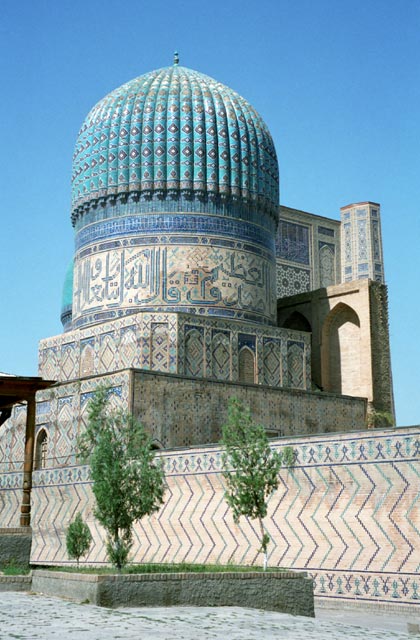 |
One of the domes of the Sher Dor (lion) medressa, in the Registan |
After breakfast we waited outside the hotel for our minibus, which arrived just after 9 o'clock, to take us to Tashkent. This minibus was quite spacious, but still got very hot inside towards the end of the 4½-hour journey. It was noticeable that the police checkpoints, which seem to occur on all main roads, got more frequent as we approached Tashkent, the Uzbek capital.
The Hotel Uzbekistan, our home for the next two nights, is a large, imposing building. The foyer was quite smart, but the rooms themselves were a bit disappointing, but better than those in the last hotel, provided that you didn't object too much to the cockroaches.
Once we had got settled into our rooms, we had a short walk in the city, taking in the pedestrianised Sayilgoh (Broadway, formerly Karl Marx Street), Mustaqillik maydoni (Independence Square, formerly Lenin Square), the Ankhor Canal and the tomb of the Unknown Soldier. Tashkent is a modern, Soviet-built city, as most of the older buildings have been destroyed by earthquakes. We returned to the hotel on the metro, which has large ornate stations similar to those on the Moscow metro. The entrance barriers are operated by plastic tokens which can be purchased for just 40 sum (about 4 pence) each.
We decided to eat at the Cassandra restaurant, listed in the Lonely Planet guide and fairly close to the hotel. We were able to sit outside, and I had the chicken kebab for my main course. The nearest thing to a local beer was a Hungarian pilsner called Osterbräu, but it went down very nicely. Prices here were dearer than in Samarkand, but still much cheaper than at home, and as there was a Visa sticker in the window, we did not worry about ordering more than we could pay for. When we came to pay the bill, which was 27000 sum, they would not accept credit cards. We pooled all our Uzbek currency together and counted it out into 27 piles of 1000 sum, mostly in 50 and 100 sum notes, and found that we just had enough.
We had noticed that there was a group speaking English on a nearby table, and as we got up to leave, we were invited to join them for a drink (or two). The guy who had been doing most of the talking introduced himself as Peter from the Freight Transport Association in London, and he was in Tashkent on business. One of his colleagues, a German called Rudi who had had far too much to drink, went up to the band who were playing live music in the restaurant, put in a request and took over on the microphone. Everyone else cringed with embarrassment, but at least he was enjoying himself.
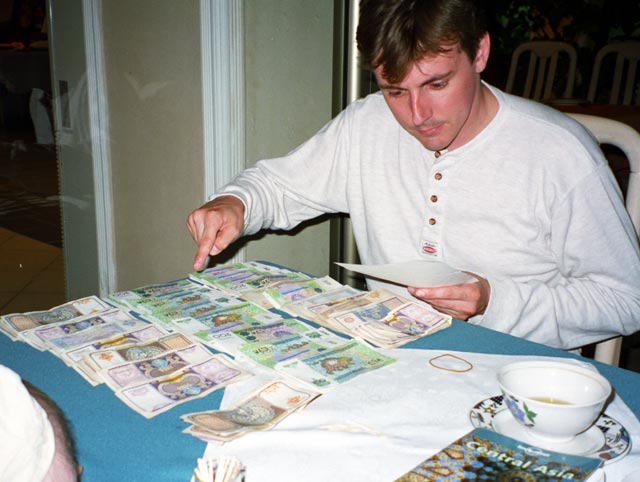 |
Dave counting out the money to pay the restaurant bill. |
For breakfast the hotel provided a good buffet with all the usual things and some more unusual ones, such as rice pudding and a selection of cakes.
This morning's destination for the four male members of the group was the railway museum, while Sandra opted to visit the Fine Arts Museum on her own. We took the metro to the railway station, and from there it was a short walk to the museum. The museum housed about 30 locomotives (steam, diesel and electric), all in the open with fading paintwork. There was also a narrow-gauge diesel train giving rides. For an admission fee of just 40 sum (4 pence), it was quite a bargain.
In the afternoon we returned to the hotel for a siesta, and also met up with Alexander, the rep of the local company, Asia Travel, who were making all the arrangements for us in Uzbekistan. He told us that the minibus would leave at 12.00 tomorrow to take us to Chimkent to catch the train to Almaty, but suggested that we travel by road all the way to Almaty, as the trains in Kazakstan were "very bad". We certainly did not fancy this, as it would be something like a 12-hour journey by road, and we were suspicious of his motives for suggesting road transport. We told him we still wanted to travel by train, and asked where we would pick up the tickets. He thought we would collect them from somebody at Chimkent, but his uncertainty worried us, so we phoned Steppes East back in England to ask them to find out what was happening and sort things out.
We then took the metro to Chorsu and had a short walk in what little remains of the old town, and visited the bazaar. There were many stalls selling meat, including pigs' trotters and other unappetising parts of animals, all very unhygienically kept, with flies crawling all over. I missed seeing the sheep's head which Brian and Sandra spotted in a woman's shopping basket.
We consulted the Lonely Planet guide to find a restaurant, and decided to take the metro to Khamid Olimjon. When we got there, we couldn't find the Violin & Tortoise restaurant, and decided that it must have been where there was a large hole in the ground, in an area that was being redeveloped. We decided to return to Amir Timur Hiyoboni on the metro and go to Cassandra again. This time I chose a French Salad, Pojarska Chicken (this turned out to be chicken burger) and chips.
On returning to the hotel we decided to have a drink in the bar, and after ordering drinks we were shocked to discover that they charged $6 for a 33cl bottle of Amstel. That is about double what you would pay in most London hotels. It would be cheaper if we paid in sum, as the exchange rate at the bar was only 300 sum to the dollar, but we didn't have enough sum on us. However, the barman offered to change some money at the black market rate, so we did this and paid in sum.
 |
The railway museum, Tashkent |
We had breakfast at 8.30. Although the food was fine, the service had Soviet touches: when a waiter approached our table, we expected him to ask if we wanted tea or coffee, but he only asked us if we wanted to change any money. During breakfast, Bill mentioned the 2-hour time difference between Uzbekistan and Kazakstan, which made us wonder whether we had sufficient time to reach Chimkent in time for the train at 17.50.
We returned to our rooms to pack, and watched TV until 11 o'clock (BBC World was available), then checked out and waited in the hotel foyer, where Alexander joined us. The minibus arrived on time at 12 o'clock, and we were soon on our way.
The border is just outside Tashkent, and we reached it in half an hour. On the Uzbek side, we had to hand in our currency declaration forms and have our luggage x-rayed, and then we moved on to the Kazak side and filled in new currency declaration forms. There was a lot of waiting around, and it took about an hour to complete the border formalities. There were constant streams of people crossing the border on foot, mostly from Uzbekistan to Kazakstan, with trolleys and barrows piled high with goods ranging from bananas to bicycle wheels.
We set off again in the minibus, but not far from the border was a police checkpoint where we had to hand in our passports so that our entry into the country could be registered with the police. This took another 15 minutes, and when this was finished we were required to give a lift to two people from the checkpoint. One of these was an important-looking man with a medal on his chest and a Kyrgyz-style felt hat.
Once we were clear of the border we made good progress, which was just as well as we didn't have much time to spare. At other checkpoints, our man in the hat gave a wave and we were waved through. We were travelling through rolling countryside, which was very brown and dry. The road was dual-carriageway, but the surface was poor and would have been uncomfortable travelling any faster than 50mph/80kph. At many places, groups of people were cutting grass and clearing bushes from the roadside.
We dropped off our two passengers in Chimkent, and arrived at the station at 17.25. Our train was waiting, and we boarded straight away and Alexander ushered us into two empty compartments, then made a quick exit. We started sorting our luggage out, but then other passengers entered our compartment and claimed it was theirs. We checked our own tickets and found that some of us were in the wrong compartment. We actually had four tickets for one compartment and one for another, instead of having two compartments for our exclusive use. Dave opted to go in the separate compartment, and found himself sharing with three young ladies, while the rest of us reorganised ourselves into the other compartment.
The train itself was in quite good condition, certainly much better than the one we travelled in from Moscow to Bukhara, and even the air conditioning was having some effect. There was no restaurant car, though, so we relied on our own supplies for food. At the station stop at Tyulkubas, there were crowds of people selling things (buckets of fruit, bread, sausages, pancakes) but we weren't really organised and we didn't have any Kazak money, so we didn't buy anything.
The scenery outside became quite mountainous as it was getting dark. The train enters Kyrgyzstan for about 20km before returning to Kazakstan, but without any border formalities. Fellow passengers on the train included a man with a long beard who opened our compartment door and said a prayer for us (at least we think that's what it was), and a railway instructor. One of Dave's companions introduced herself as Atnashash, a Kazak now living and working in Turkey.
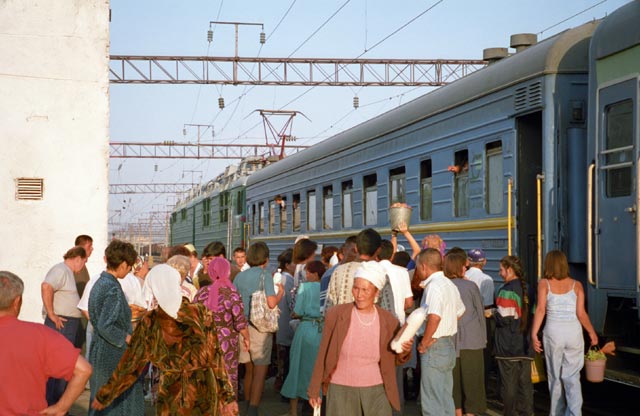 |
The Chimkent - Almaty train at Tyulkubas station |
After a very poor night's sleep, I awoke to find the train travelling through a flat landscape, but it soon became hillier and by the time we reached Almaty there were snow-capped mountains in the near distance. We were met by our guide, Leila, and taken by minibus to the Hotel Otrar. We checked in and found that the rooms were quite comfortable.
We were too late for breakfast at the hotel, so we changed some money and went for a walk in search of a restaurant for an early lunch. We chose one called Inara, which provided us with a good selection of shashlik, kebabs, salad, cheese, bread, rice and chips. They also had a local beer, called Tien Shan after the nearby mountain range. On paying the bill, we found that the prices were a lot higher than in Uzbekistan, and we used most of the money we had just changed.
In the afternoon, we walked up the hill to the Palace of the Republic and sat by the fountains for a while, then took the cable car up to Köktyube, a hill overlooking the city. We sat at a café and had an ice cream, before returning on the cable car and walking back to the hotel via Independence Square and the impressive war memorial in Panfilov Park.
In the hotel we changed some more money, and this time we noticed that we had been short-changed by 1000 Tenge (about $7). The cashier paid the shortfall, but clearly they had played the same trick this morning without us noticing.
Almaty is a far more prosperous city than anywhere else in Central Asia, with many good shops and restaurants. We went to a Korean restaurant for our evening meal. Brian had some language problems while trying to order some vegetarian food, but we ended up with a large selection of small dishes of things, mostly vegetarian and mostly very spicy. I also had shredded pork with vegetables as my main course.
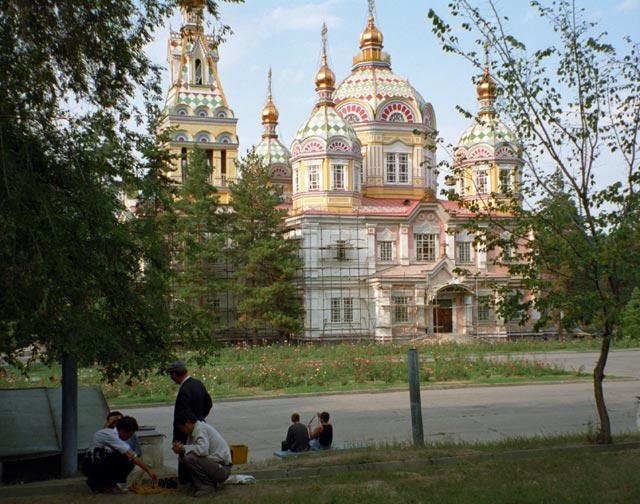 |
Zenkov Cathedral, Almaty |
We went out shortly after 8 o'clock for a walk in the park, and to photograph the war memorial with the morning sunlight shining on it. The memorial is a huge sculpture in the shape of the Soviet Union, with figures of soldiers in front protecting it, and an eternal flame.
We returned to the hotel for breakfast, which was a good buffet including bacon, scrambled egg, sausage, fried potatoes and pancakes.
Following breakfast, we packed our bags, checked out, and stored our luggage in the hotel for collecting in the evening. We then did some shopping for provisions for our next train journey, stocking up with apples, pears, cheese, tomatoes, fruit juices and vodka.
For this afternoon, we had booked a guided tour of the city with Leila, and she turned up at the hotel with minibus and driver at 14.00. The tour took us to the war memorial (again), Zenkov Cathedral, the Museum of Kazak Musical Instruments, the Palace of the Republic, the Independence Monument, the Hyatt Regency Hotel, the Mosque and the bazaar. At the bazaar, we bought some bread, strawberries and raspberries for the train journey.
The Inari restaurant provided us with another good meal in the evening, then we walked back to the hotel to pick up our luggage and await the minibus transfer to the railway station.
Train No.14 "Zhibek Zholy" ("Silk Road") to Ürümqi departed at 20.54. This train was the most comfortable so far, very well maintained, with 2-berth compartments in soft (first) class. We bought some bottles of beer on the station before departure, and drank them on the train with the raspberries and strawberries. Most of the vodka was then consumed while playing rummy (a card game) well into the night.
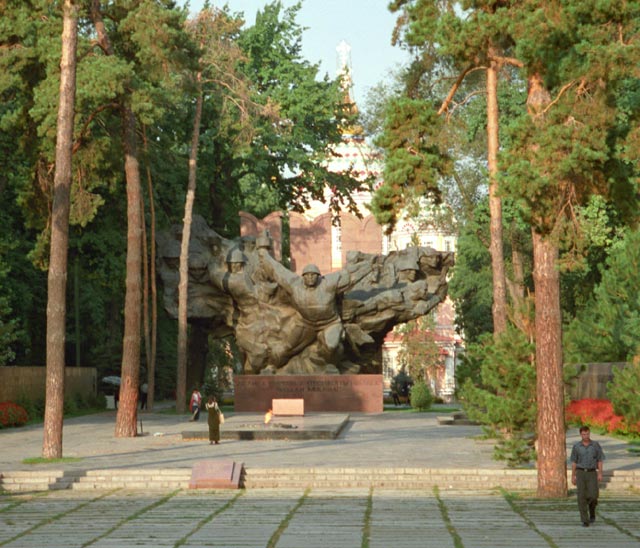 |
The war memorial in Panfilov Park, Almaty |